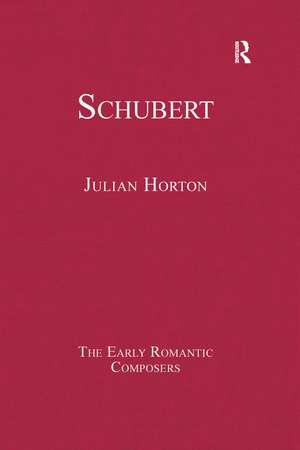Schubert: The Early Romantic Composers
Autor Julian Hortonen Limba Engleză Hardback – 11 dec 2015
Preț: 1418.32 lei
Preț vechi: 2052.97 lei
-31% Nou
Puncte Express: 2127
Preț estimativ în valută:
271.48€ • 294.99$ • 228.19£
271.48€ • 294.99$ • 228.19£
Carte tipărită la comandă
Livrare economică 21 aprilie-05 mai
Preluare comenzi: 021 569.72.76
Specificații
ISBN-13: 9781472439376
ISBN-10: 1472439376
Pagini: 516
Dimensiuni: 169 x 244 x 40 mm
Greutate: 1.23 kg
Ediția:1
Editura: Taylor & Francis
Colecția Routledge
Seria The Early Romantic Composers
Locul publicării:Oxford, United Kingdom
ISBN-10: 1472439376
Pagini: 516
Dimensiuni: 169 x 244 x 40 mm
Greutate: 1.23 kg
Ediția:1
Editura: Taylor & Francis
Colecția Routledge
Seria The Early Romantic Composers
Locul publicării:Oxford, United Kingdom
Cuprins
Contents: Introduction. Part I History and Biography: Poor Schubert: images and legends of the composer, Christopher H. Gibbs; Franz Schubert and the peacocks of Benvenuto Cellini, Maynard Soloman; The peacock’s tale: Schubert’s sexuality reconsidered, Rita Steblin; Constructing a Victorian Schubert: music, biography and cultural values, David Gramit; Unfinished considerations: Schubert's ‘unfinished’ symphony in the context of his Beethoven project, John Gingerich. Part II Reception and Interpretation: Schubert’s Symphony in C, Robert Schumann; Schubert (1928), Theodor W. Adorno; Schubert’s promissory note: an exercise in musical hermeneutics, Edward T. Cone; Schubert and the sound of memory, Scott Burnham. Part III Harmony and Tonality: Tonality, Donald Francis Tovey; As wonderful as star clusters: instruments for gazing at tonality in Schubert, Richard L. Cohn; Three examples of functional chromatic mediant relations in Schubert, David Kopp; ‘Die junge Nonne’ (D. 828), David Damschroder with David Kopp. Part IV Instrumental Music: Schubert’s sonata form and Brahms’s first maturity, James Webster; Sonata form in Schubert: the first movement of the G-Major String Quartet, Op. 161 (D. 887), Carl Dahlhaus; On the subject of Schubert’s ‘unfinished’ symphony: was bedeutet die Bewegung?, Richard Kurth; Schubert’s homecoming, Nicholas Marston; Schubert’s sonata forms and the poetics of the lyric, Su Yin Mak. Part V Song: A romantic detail in Schubert’s Schwanengesang, Joseph Kerman; ‘Auf dem Flusse’: image and background in a Schubert song, David Lewin; Behind the scenes: die schöne Müllerin before Schubert, Susan Youens; The Schubert Lied: romantic form and romantic consciousness, Lawrence Kramer; The shadow of midnight in Schubert's ‘Gondelfahrer’ settings, David T. Bretherton. Name index.
Notă biografică
Julian Horton is Professor and Head of the Department of Music at Durham University, UK and President of the Society for Music Analysis.
Descriere
This collection offers an overview of Schubertian reception, interpretation and analysis. The previously published journal articles represent the best of scholarship in this field and survey the issue of Schubert’s alterity, his interpretative strategies and hermeneutic positions, his handling of harmony and tonality, and the reception of his instrumental music and song. This volume highlights the complexity and diversity of Schubertian scholarship as well as the overarching concerns raised by discrete fields of research in this area.


